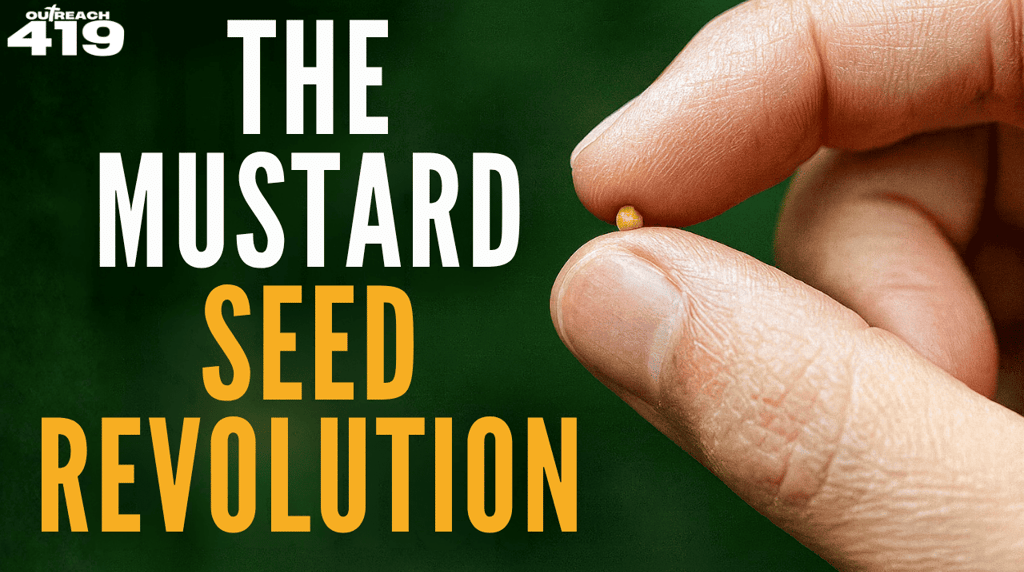The Mustard Seed Revolution
Many of us have been taught to have "faith like a mustard seed." In difficult times, this is often presented as a comforting thought—permission to have a very small, fragile, just-barely-hanging-on faith. It suggests that even the tiniest speck of belief is enough. While well-intentioned, this popular interpretation misses the most powerful and revolutionary part of the message.
SUNDAY MESSAGE RECAP
Robert Woldhuis
10/22/20254 min read


The focus on smallness has overshadowed the true meaning of the metaphor. It's not about celebrating a tiny faith; it's about understanding the explosive potential contained within that faith, no matter how small it starts. As one speaker reflected on this common teaching:
"I realized suddenly that I was taught very wrong. What this actually is saying in the Bible has nothing to do with a tiny faith. Has nothing to do with being small."
This post will unpack a few counter-intuitive takeaways from the mustard seed analogy. We will reframe this powerful symbol from something tiny and fragile into a blueprint for mighty, world-changing potential.
It’s Not About Size, It’s About Invasive Potential
The core misunderstanding of the mustard seed metaphor is the focus on the seed's smallness rather than the nature of the plant it becomes. The point isn't that faith can be tiny; the point is what that faith is destined to grow into.
A mature mustard plant is not a small, delicate herb. It grows vigorously to become a massive shrub, often 10 to 12 feet tall. It spreads, takes over, and becomes a sheltering place for animals. Its growth is "invasive"—a powerful, positive metaphor for the impact of true faith. The metaphor is about the incredible, disruptive, and world-altering potential contained within a seemingly insignificant start. It’s not about the virtue of staying small.
"So when we read in the Bible like a mustard seed, don't make yourself tiny because it's not talking about that... I was taught that this was all about you know when you just feel like you can't do it just have a tiny little bit of faith... and they miss the best part of this whole thing."
This realization is more than just an academic distinction; it's a fundamental reorientation that turns a comforting platitude into a revolutionary call to action. It reframes our entire understanding of what our faith is for.
True Growth Requires Being Buried and Broken
We are tempted to protect our faith, to think, "I'm going to keep it safe right here where nothing can harm it." But then, it's never more than a tiny seed. The process of growth is non-negotiable: the seed must be planted underground, in darkness. Its hard outer shell must break open. This process is not a sign of failure, but a prerequisite for life.
This natural process is a direct analogy for our spiritual experience. Think of David, who was anointed to be king—the seed was planted—but then he had to run for his life and hide in dark caves. His breaking and pressure were part of his growth. Similarly, a person in addiction recovery often hits "rock bottom." This dark, breaking point is the ground where the seed of surrender is planted, allowing a new life to begin.
This is a counter-intuitive but essential truth. The pressure, struggle, and moments of breaking are not signs that something is wrong. They are the necessary conditions for the outer shell of our old life to fall away so that profound growth can begin. Even as we emerge, we might see, like on a new seedling, "the little shell pieces still hanging off the end"—a messy but beautiful reminder of the breaking that was required to grow.
A Mature Faith Must Be Disruptive
As a seedling emerges from the soil, it "disrupts the ground." It fundamentally changes the environment where it was planted. This is the role of a person of faith and of a healthy community: to be a positive disruption in the world.
This disruption isn't about being confrontational for its own sake. It is about actively bringing about positive change. "We bring love when hate is there. We bring healing when there is sickness there." But this role requires immense bravery. I know this struggle firsthand. I'm a "get along" kind of girl, and I've had to learn to be brave, because true faith doesn't allow us to just get along to get along.
Sometimes, this disruption means challenging cultural trends within the church. It means having difficult conversations with fellow believers when we see things going in a direction that doesn't align with Jesus. It’s loving people enough to say, "I need to talk to you about something, because what I'm seeing isn't matching what I'm reading." This is the difficult, actionable practice of a mature faith that refuses to stay silent.
The Ultimate Purpose of Growth is to Spread
The mustard plant doesn't just grow for itself. Its ultimate function is to spread and provide shelter for others. This is the final stage of the metaphor and the ultimate purpose of our own growth.
A powerful analogy comes from recovery programs: Step 12. A person who has found recovery has a responsibility to carry the message to others who are still struggling. Recovery isn't a private achievement; its purpose is fulfilled when it is shared.
This isn't just a theory; it's the story of my life. I have to ask myself:
"What good does it do anybody that I'm recovered if I don't do something with it? ... If we just kept that little thing in our pocket, what good does it do anybody?"
If I had reached recovery and kept my mouth shut, Outreach would not exist. This is what the "invasive spread" of the mustard seed represents. It is about sharing hope and becoming a resource—a place of shelter and life—for others. Faith, like recovery, becomes stagnant if it is hoarded.
Conclusion: What State Is Your Seed In?
The metaphor of the mustard seed is not an excuse for smallness but a call to greatness. It’s a challenge to stop protecting our little seed of faith and instead plant it in the messy, difficult ground of real life. It is a promise that what starts small, when surrendered to the process of being buried and broken, will grow into something mighty, invasive, and generative that becomes a source of life for the world.
My gentle loving challenge to all of you.
"What state is your seed in? Have you planted it yet? Has it started to grow? And if it has, is it still this tiny little seedling or is it multiplying?"
